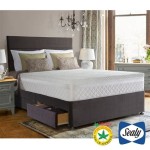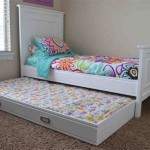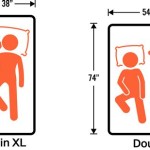What Is a Good Age to Switch From Crib to Toddler Bed?
Transitioning a child from a crib to a toddler bed is a significant milestone in their development. It marks the transition from infancy to toddlerhood, and the shift in sleep environment signifies a newfound independence. While there is no definitive age for this transition, several factors come into play, influencing the optimal time for the switch.
Factors to Consider for the Transition
Several factors contribute to determining the readiness of a child for a toddler bed. These factors encompass both the child's physical and developmental milestones, as well as the practical considerations of the parents.
1. Physical and Developmental Milestones
The child's physical and developmental milestones serve as indicators of readiness for a toddler bed. These milestones typically emerge around the age of 18 months, but the exact timing can vary.
- Height and Weight: As children grow, they may become too large for their cribs. If a child constantly bumps their head or feet against the crib rails, it might be time to transition to a toddler bed.
- Mobility and Climbing: Toddlers develop an increasing desire to explore their surroundings and have the physical ability to climb. If a child can climb out of their crib, it is a sign of readiness for a toddler bed.
- Cognitive Development: Children begin to understand cause and effect and comprehend basic instructions around this age. They can understand the concept of staying in bed and sleeping.
2. Practical Considerations
Practical factors also play a part in determining the optimal time for the transition. These factors involve the family's routines, sleep habits, and available resources.
- Sleep Habits: If a child has consistent sleep habits and can sleep through the night, transitioning to a toddler bed is typically easier. Consistently waking up during the night for feedings or comfort can be a sign that the child may still be too young.
- Family Routines: Consider your family's routines and schedules. It is easier to manage the transition if you can dedicate time and energy to support your child during this period. A busy family might find it challenging to deal with potential disruptions during the initial transition.
- Availability of Resources: Access to resources like a toddler bed, bedding, and a safe sleep environment is essential. Make sure you have the necessary resources in place before embarking on the transition.
Tips for a Smooth Transition
Moving from the familiarity and comfort of a crib to a new bed can be challenging for a child. Transitioning gradually and consistently can minimize disruptions to sleep patterns.
1. Gradual Introduction
Introduce the toddler bed gradually, allowing your child to explore it before sleeping in it. Let them play in the bed, read stories in the bed, or have naps in the bed. This helps familiarize them with the new bed and reduces anxieties.
2. Create a Familiar Sleep Environment
Maintain a familiar and comforting sleep environment for your child in the new bed. Using their favorite blankets, stuffed animals, or nightlights can help create a sense of familiarity and security.
3. Establish Consistent Bedtime Routines
Consistency in bedtime routines is essential for healthy sleep habits. Maintain a consistent bedtime routine, including bath time, story time, and quiet time, to prepare your child for sleep. This routine signals the body that it's time to wind down and prepare for sleep.
4. Positive Reinforcement
Praise and positive reinforcement are essential when transitioning to a toddler bed. Reward your child for staying in bed and sleeping through the night. This positive reinforcement encourages them to repeat the desired behavior.
When to Seek Professional Help
While transitioning to a toddler bed is typically a smooth process, some children may experience difficulties adjusting to the change. If a child consistently struggles with sleep, exhibits increased anxiety, or shows signs of regression after the transition, it is advisable to consult a healthcare professional or sleep specialist. They can provide personalized advice and strategies tailored to your child's specific needs.

















